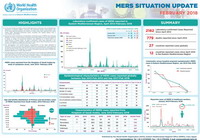 MERS situation update MayHighlights, May 2018
MERS situation update MayHighlights, May 2018
- At the end of May 2018, a total of 2220 laboratory-confirmed cases of Middle East respiratory syndrome (MERS), including 790 associated deaths (case–fatality rate: 35.6%) were reported globally; the majority of these cases were reported from Saudi Arabia (1844 cases, including 716 related deaths with a case–fatality rate of 38.8%). During the month of May, a total of 12 laboratory-confirmed cases of MERS were reported globally: 11 cases in Saudi Arabia including 1 associated death and one case reported in United Arab Emirates.
- A household cluster of 8 laboratory-confirmed MERS cases was reported in Najran Region during the last week of May. Apart from the index case, who had history of contact with camels and also consumed raw camel milk before he was diagnosed, none of the remaining seven cases in this cluster had any history of contact with camels. The index case had a date of onset of symptoms on 17 May 2018 and by 31 May, seven symptomatic secondary cases were reported from this cluster. More cases are expected to be reported from this cluster as the close contacts are being followed up and the laboratory test result of some of the close contacts are awaiting.
- The demographic and epidemiological characteristics of reported cases, when compared during the same corresponding period of 2013 to 2018, do not show any significant difference or change. Owing to improved infection prevention and control practices in hospitals, the number of hospital-acquired cases of MERS has dropped significantly since 2015.
- The age group of 50–59 years continues to be at highest risk for acquiring infection of primary cases. The age group 30–39 years is most at risk for secondary cases. The number of deaths is higher in the age group 50–59 years for primary cases and 70–79 years for secondary cases.”








